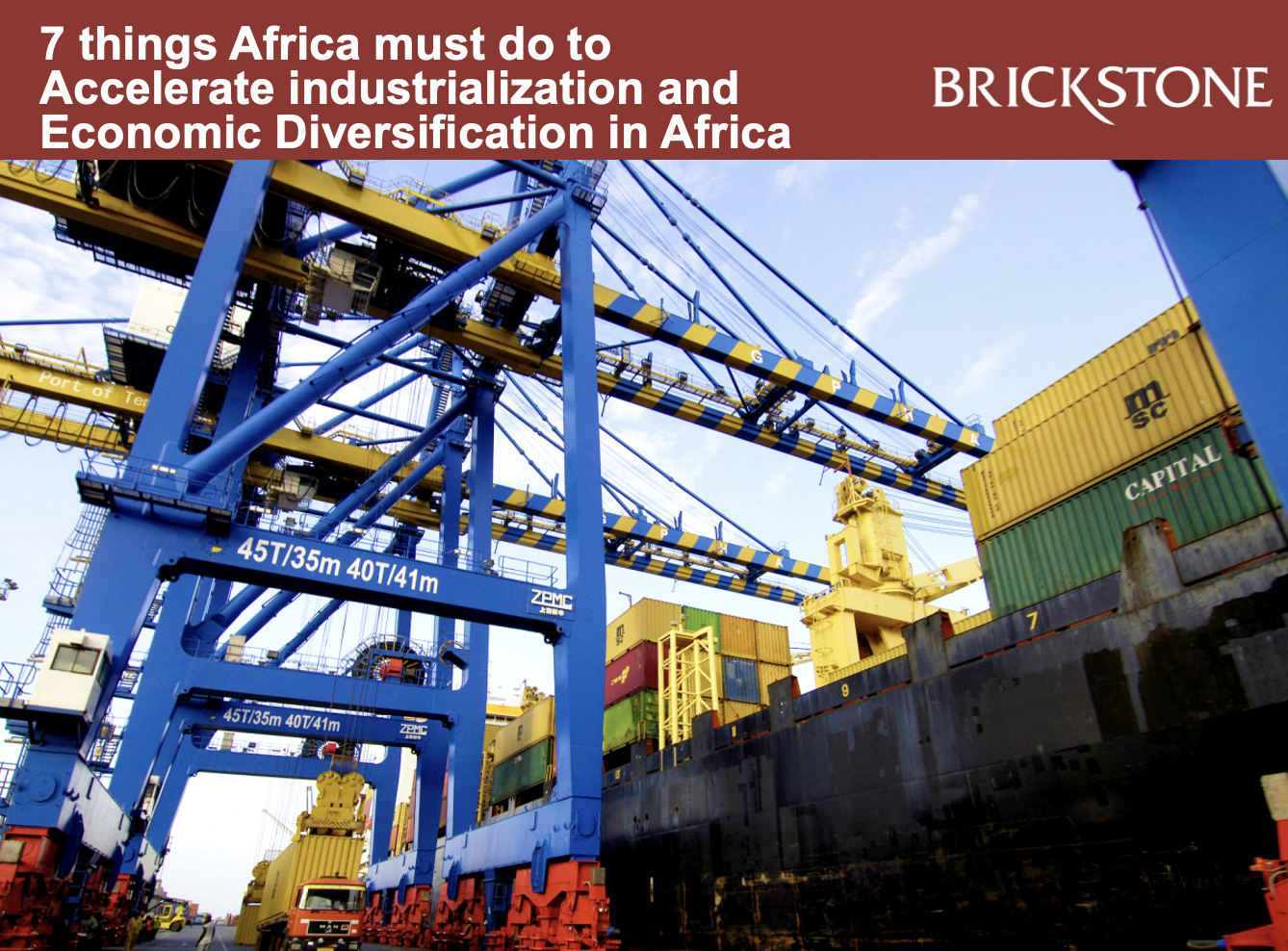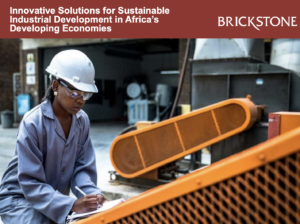7 things Africa must do to Accelerate industrialization and Economic Diversification in Africa
No country or region in the world has achieved prosperity and a decent socio-economic life for its citizens without the development of a robust industrial sector. Over the years, African leaders have restated their determination to seize emerging opportunities to foster industrial development as an effective, socially responsible and sustainable means towards economic transformation.
Many African countries have over the years experienced an unprecedented growth rate, partly linked to a “commodity-boom” and partly due to sound economic governance. Nevertheless, there has been a subdued industrial supply response to several years of macroeconomic stability. This is ascribed largely to a number of supply-side constraints: the lack of the required industrial capacities and capabilities, inadequate entrepreneurship and institutional support, energy and infrastructure bottlenecks and demand constraints due to the low purchasing power of the vast majority of the population and a low aggregate demand from the public sector.
This article by Brickstone Africa reviews the African Union’s report on key steps Africa must take to accelerate industrialization and economic diversification in Africa, highlighting key facts and insights.
African Industrial Development And Economic Diversification
According to the African Union, supply-side constraints have constituted a persistent problem for African industrial development requiring emphasis on creating a conducive and coherent policy environment. There is also an urgent need to generate skills, stimulate productivity, promote investment, provide infrastructure and transport facilities, upgrade enterprise operations, transfer technology, reduce the costs of doing business and introduce appropriate standards to enable products to compete in international markets.
Industrialization, with strong linkages to domestic economies, will help African countries achieve high growth rates, diversify their economies and reduce their exposure to external shocks. This will substantially contribute to poverty eradication through employment and wealth creation.
Supply-side constraints continue to exist outside the manufacturing sector. Further, a lagging agricultural sector has constrained industrial production and competitiveness in many countries due to inadequate or irregular supply of raw materials. This in turn, has constrained the growth of manufacturing based on agro-products or processing. Although major challenges persist, none of them are insurmountable: the ever-diversifying global economy and its industrial value-chains, and the growth of industrial dynamism in the South create as many opportunities for participation as they produce new challenges. Most importantly they create an urgency to act decisively by strengthening local capacities, activating dynamic Regional Economic Communities and acting co-operatively at a continental-level.
The following are key steps Africa must take to accelerate industrialization and economic diversification in Africa:
-
1
Industrializing Africa through Regional Value Chains Development: In looking at avenues to industrialize Africa through Regional Value Chains Development, intra-African value chain integration is key to reduce export dependency on unprocessed goods and natural resources and paving way towards higher value addition and a more diversified export basket. 61% of intra-African trade occurs in processed and semi-processed goods, and exports to Africa are more diversified and technologically advanced than those to other regions. Increasing the competitiveness of African value chains will also increase resilience to supply chain shocks, made more evident by the COVID-19 pandemic.
-
2 [/gdlr_dropcap]African Fashion Industry Value Chain and Pan African Fashion Initiative Strategy: The fashion value chain has the potential to contribute to the economic transformation of the continent but several challenges hamper its development including among others, the lack of effective policy and regulatory frameworks, high-capacity technology networks, market linkages and trade barriers. The main strategic pillars and intervention areas for promoting African Fashion Value Chains are effective policies, enabling business environments, capacity building, access to finance, market access and enforcing standards, quality and certification.
- [gdlr_dropcap type="circle" color="#ffffff" background="#e36d39"] 3
Innovation, Intellectual Property and Rights, and Technology Transfer for Enhanced Productivity, Competitiveness and Accelerated Industrialization: The role of Intellectual Property in promoting value addition on the continent particularly in the tourism sector, demonstrate the positive impact of Intellectual Property in the value chain. It is important for Africa to fast-track the uptake of Intellectual Property and leverage it to add value to economies. Intellectual property provides the right tools to add value, not only to the commodities but also to the industry, services, and the economy in general. Entrepreneurs and Governments are finding it increasingly difficult to conduct their activities without considering Intellectual Property and Rights.
-
4
The Africa Quality Policy: A key challenge for Africa, is to move away from an economic growth path built on consumption and commodity exports, onto a more sustainable developmental path based on production and trade of high-quality products and the promotion of environmental and social well-being. Ensuring products and services produced in Africa meet requisite standards is critical. Africa must therefore invest in quality standards by developing and supporting quality control institutions at the national, regional and continental levels. A quality policy will ensure this is done in an organized and coordinated manner. The proposed Africa Quality Policy lays down policy directions for the operation of a continental-level quality institution.
-
5
Made in Africa Standards and Guidelines: In evaluating the state of Women in Processing in Africa, the existing barriers for growth and development of their businesses, the huge potential and their dominant role in the informal sector recurs. However, there is a huge deficit in investment in women of approximately 42 Billion Dollars. Besides the investment shortfall, the women do not have access to critical assets, from production through to technical skills that are needed to compete effectively in domestic, regional, continental to global markets. The initiative therefore proposes the development of radical policies that will see the establishment of Special Economic Zones (SEZs) in all AU Member States.
-
6
African Women and Youth in the Industrial Development in Africa initiative: In evaluating the state of Women in Processing in Africa, the existing barriers for growth and development of their businesses, the huge potential and their dominant role in the informal sector recurs. However, there is a huge deficit in investment in women of approximately 42 Billion Dollars. Besides the investment shortfall, the women do not have access to critical assets, from production through to technical skills that are needed to compete effectively in domestic, regional, continental to global markets. The initiative therefore proposes the development of radical policies that will see the establishment of Special Economic Zones (SEZs) in all AU Member States.
-
6
Financing Africa’s Industrialization Agenda: Financing industrialization in Africa calls for pragmatic and feasible ways that interrogate past financing strategies for African industrialization and the challenges that remain. This has led to an evaluation of the traditional financing mechanisms which include domestic resource mobilization (DRM), foreign direct investment (FDI), and development financial institutions (DFI) and mapping of the major African regional and continental financing institutions and their role in financing industrialization in Africa.
Read more here.






